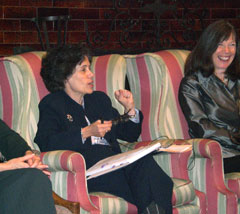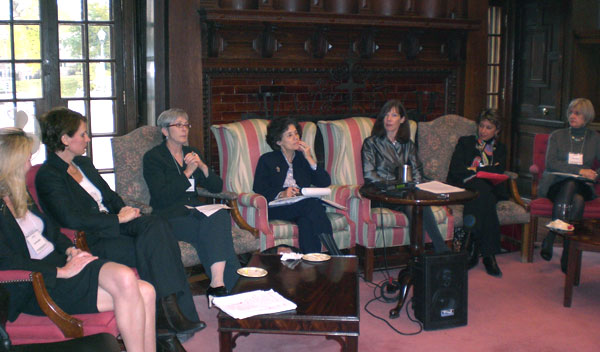
Professor Judith Resnik (Yale Law School) speaks at "A Conversation with Women Leaders in Law" |
"When I get up in the morning, I ask myself, 'how am I going to fail today -- as a lawyer, as a parent, as a spouse?' Most days I feel I fail at all three."
These sentiments, common to women in private law practice, were shared during "A Conversation with Women Leaders in Law," as part of an informal discussion of current developments in retaining women in private law practice. This event was a follow-up to last year's Summit on Gender Diversity and Law, as part of the Faculty of Law's commitment to taking a leadership role on issues relating to gender, diversity and the profession.
Held October 24, 2008 in a crowded Faculty Lounge at Flavelle House and facilitated by Dean Mayo Moran, special guest Professor Judith Resnik (Yale Law School) joined in a discussion with Josée Bouchard (Law Society of Upper Canada), Kirby Chown (McCarthy Tétrault), Justice Bonnie Warkentin (Superior Court of Justice), Professor Rebecca Cook (U of T Law), Laurie Pawlitza (Torkin Manes), and Professor Denise Réaume (U of T Law).
Statistics in Ontario have shown that for years now, more women than men are called annually to the bar. Women outscore men in record numbers in another important but less impressive area: they leave their profession two and a half times more often, begging the question, 'are women less committed to the profession of law?'
Kirby Chown, a member of the Law Society of Upper Canada's Expert Advisory Group to the Retention of Women Working Group, says women leave because private law practice is not adapting to the realities of childbirth as well as the realities of bearing greater responsibility for family care-giving.
"Six hours of coaching, two before (maternity leaves), two during and two on return, are provided by the Law Society and have shown to be helpful, and peanuts when you consider the cost of losing an associate," explains Chown.
The departure of women from private practice shows the staggering cost of associate turnover and means the legal profession is losing large numbers of its best and brightest in core areas. Studies show shifts in thinking are required by both associates and firms, shifts that recognize the biological realities of child-bearing years and the economic realities of operating a law firm.
While more data exist in the United States, Professor Resnick says the story is similar: the retrenchment of women is horrific; women earn 77 per cent of what men do, and are taking a much greater nurturing role all around, not just in child care, but in the care of elders. Handling it all, along with increasing demands for high quality work, requires women to excel on all fronts.
Professor Rebecca Cook, Faculty Chair in International Human Rights, says the stereotyping of women is also transnational phenomenon with tremendous force to diminish women's capacity.
"When women in private law practice are stereotyped, the resulting negativity, hostility, and isolation make for a very uncomfortable working environment, meaning they tend to leave more readily." Stereotyping is very subtle in how it's shown, she says, and "still there is no clear understanding and very little research on how women are stereotyped. There is still so much to be done." Professor Cook is co-authoring a book to be published soon entitled Stereotyping of Women: Transnational Legal Perspectives.
Laurie Pawlitza is co chair of the Justica Project, the Law Society's new three-year pilot project, a first of its kind in Canada designed to retain and advance women lawyers in private practice, which officially launches November 17.
"The shocking fact is that in Ontario, where only 59 firms have 25 lawyers or more, the majority do not have a written policy on maternity leave," says Pawlitza. "It's like every time a woman in a law firm becomes pregnant, it's the first time it's ever happened. She is the most out of control she will ever be, with control over neither work nor nurturing tasks."
It is just as bad for the 56 per cent of Ontario law firms with five lawyers or less, says Josée Bouchard, an expert in human rights, linguistic rights and equity and diversity issues. "Within small firms of five lawyers or less, there is less ability to take time off as there are fewer colleagues to rely upon. The biggest goal for women is the ability to take a leave of absence without losing ground."
The Law Society's ground-breaking parental leave program pays lawyers $3,000 per month over three months to allow women to take time to give birth without backsliding at the office.
"I'm impressed at this new $9K structure to change the norm. It is tremendously useful," says Resnick. "We must be glad we're made progress, but we can't rest on our laurels."

L-R: Josée Bouchard, Justice Bonnie Warkentin, Professor Denise Réaume, Professor Judith Resnik, Dean Mayo Moran, Laurie Pawlitza and Kirby Chown


